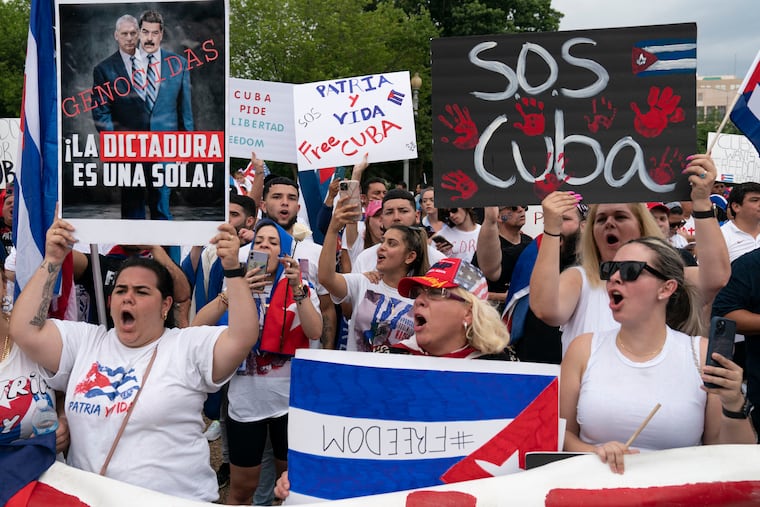Biden should help Cubans push for change, not violent revolution | Trudy Rubin
The best way to help Cubans is not by invasion, but by encouraging economic ties to the United States and offering vaccine aid.

Back in 2016, when expectations for change were running high in Cuba, I traveled to Havana and spoke with Cuban academics, artists, independent bloggers, and private businesspeople.
The hopes they expressed, and the disappointments that followed, explain the demonstrations that broke out in Cuba earlier this month. In fact, it is surprising those demonstrations didn’t erupt earlier.
And what I heard then offers insights into how the Biden administration should respond to the recent protests across Cuba.
» READ MORE: From 2016: Trudy Rubin writes from Havana, Cuba
It isn’t, as Miami’s Cuban American, Republican Mayor Francis Suarez suggested, by military intervention.
If the United States has learned any foreign policy lesson over the past 20 years, it should be that U.S. efforts to change regimes by force end very badly. Far better to empower Cubans themselves by legitimate means.
In 2016, President Barack Obama had eased travel restrictions for Americans to visit Cuba and Cuban Americans to send remittances to relatives on the island. That money was fueling a surge in private restaurants and guest houses to serve new visitors from abroad.
Obama and then-President Raúl Castro (Fidel’s brother) were in the process of normalizing relations.
I repeatedly heard expectations that, as an aged Fidel faded — he died in late 2016 — and his aging brother moved toward retirement, the much younger vice president, Miguel Díaz-Canel, would soon take over. “The party will get rid of old folks and bring new faces,” one economist told me. “In the next three years, there will be profound changes.”
I heard repeated demands for the government to permit more free enterprise and to facilitate private farming (which would alleviate food shortages, since Cuba imports the bulk of its foodstuffs). I also heard demands for open access to the internet (which was tightly controlled then) and independence for artists and journalists.
“Young people see their parents have less than their grandparents,” a blogger told me. “They want more than free education and health care.”
In other words, encouraged by Obama’s opening to Cuba and by hopes for internal change, many Cubans believed they would see dramatic reforms at home, despite a continuing U.S. trade embargo.
Most Cubans I spoke to did not seek another violent revolution but sought the kind of free markets permitted by communist regimes in Vietnam and China.
Their hopes were dashed.
At home, President Castro surrounded himself with conservatives and failed to move on economic reforms. Rather than encourage free enterprise, the Cuban government continued to lean on socialist Venezuela for financial and energy aid.
In the U.S., President Donald Trump reversed Obama’s opening and imposed more sanctions — stopping tourism and remittances to Cuba.
Díaz-Canel only became president in late 2019 (the same year that Cubans finally got social media access), and only began to introduce economic reforms in 2021. By then, an impoverished Venezuelan regime had cut subsidies and cheap oil deliveries to Cuba.
And in 2020, COVID-19 struck, ending tourism from Europe and slamming the economy, while shrinking foreign currency reserves. Although the Cuban medical system did well at first, a desperate government permitted an influx of Russian tourists who reportedly spread the delta variant.
The result: empty shelves, long food lines, severe energy shortages, and a spreading coronavirus. And demonstrations across the country, with participants protesting economic collapse, and many calling for “freedom.”
So how should Biden respond?
“There have been missed opportunities on all sides,” says Richard Feinberg, a longtime Cuba expert at the University of California, San Diego. Not only did the Cuban government fail to reform its economy, but Biden failed to follow through on campaign promises to undo many Trump-era sanctions. Had Biden done so, Feinberg believes, “He would be in a better position to discuss reforms [with Havana] along with Cuba’s alliance with Venezuela.”
Given those realities, the White House should let the Cuban people take the lead.
» READ MORE: How the Chinese Communist Party's 100th anniversary relates to July 4th | Trudy Rubin
Biden has said, “We stand with the Cuban people” on “the right of peaceful protest and the right to freely determine their own future.” It is important for Biden and democratic allies to repeat that pledge, including calls for an open internet.
But any effort by the United States to openly intervene in what were clearly spontaneous demonstrations can only delegitimize a genuine Cuban protest. And it could spur a geopolitical conflict if Russia intervenes.
Instead, Biden should reinvigorate Obama’s effort to link Cuba more closely to the United States and its people by dropping Trump’s restrictions on tourism and remittances. Perhaps this can’t be done immediately — lest it appear to reward a government crackdown. But, if the Cuban government refrains from more repression, it should be done soon.
And before Russia or China offer Cuba assistance with their COVID-19 vaccines, Biden should follow up his offer to send vaccines — so long as they are administered by an international organization. And he should help Havana get the necessary materials for Cuba’s home-produced vaccine.
The best way to encourage Cuban demands for more freedom is to offer its people hope for change the Communist Party can no longer dare to deny them. Those hopes rose under Obama and were dashed by Raúl Castro, abetted by Trump. Biden can do better than that.